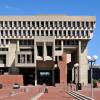Call it the Trump Effect. The New York billionaire scored his second largest plurality to date in Massachusetts' March Republican primary. The foundation of Trump's appeal -- in the Bay State and throughout the nation -- is his promise to enforce the letter of federal immigration law. An unintended consequence of Trump's unwavering stance has been to motivate legal immigrants who still are not citizens (green card holders) to accelerate their efforts to become full-fledged citizens so they can vote against him in November's presidential election.
In a downtown Boston building and an elevator ride down two flights I walked into a room filled with immigrants sitting at tables and talking with counselors. The “citizenship clinics” are run by MIRA, the
Massachusetts Immigrant and Refugee Advocacy Coalition. Sarang Sekhavat runs the citizenship registration program.
“So the idea here is we bring together a lot of volunteers and a lot of green card holders who are interested in applying for citizenship. We help them work through the application, get the application done.”
Sekhavat said MIRA helps to expedite the process.
“We, as an organization, will actually sign on as their representatives and mail in their applications, and help them through the whole process as they work toward their citizenship.”
To be a citizen you must start with a green card, which allows you to live and work in the US permanently. After 5 years, you can can apply for citizenship. But for many of the more than 8 million eligible Americans, five years can easily become 20 or 30 years. They don’t apply for a lot of reasons, including cost. At $680, it is a steep price for many who hold low paying jobs. So, MIRA says a lot of folks start the process, but never complete it. Now, people are flocking to: first get citizenship, and then register to vote before the October 19th deadline.
“It's been a lot of people. And I think last couple of clinics we’re talking probably in in the ballpark of 200 people.” Far more than usual, said Max Wirka a student volunteer:
“Lots of people from Latin America, Guatemala, the Dominican Republic vacations from actually the Mattapan Dorchester area we've actually done clinics in at the Haitian multi service center in Dorchester and that's a pretty big Community for us we also do clinics with the Brazilian Community Center out in Framingham, we had some Brazilians today.”
Ana Dias, a green card holder, is from Brazil. I asked her why? Why this year did she decide to try to become a US citizen.
“I completed 5 years here in March. This is such a special year because of the elections. So I think it's a perfect time for me to become an American citizen and vote for the first time, and also be more engaged, more civic engaged.”
Dias said she didn’t sign up this year to vote for a particular candidate but against one.
“Because of Trump. I think he's very radical and extremist and I think it's not a good way to run a country.”
Wirka said he’s heard that a lot, in the exit interviews that MIRA does at the citizen clinics.
"I definitely think there's a sense of urgency around voting. Overall, I think people feel like given how immigration’s become an issue, they really want to have a voice in what happens next."
Federal officials are also noticing a surge in naturalization applications in other immigrant centers like Chicago, New York, and San Francisco. In Massachusetts, requests for applications are the highest since 2008. Many permanent residents applied that year to vote for Obama, according to citizen exit interviews.
Green cards confer many of the same advantages of citizenship but one: only U.S. citizens can vote. And not everyone is rushing to become a citizen vote against Trump. Anecdotal evidence nationally finds that the GOP frontrunner has some support (
though comparatively little) among new citizens from Latin America, East Asia, South Asia and elsewhere.
So, love him or hate him, there's no question that Trump is helping to create a whole new set of American citizens.
WHERE DO IMMIGRANTS LIVE IN MASSACHUSETTS?
Kyle Walker, an assistant professor of geography at Texas Christian University, developed this interactive dot map to show where new immigrant populations live in the United States. Link here and drag the curser across the country to Massachusetts for a closer look. Walker utilized data from the 2009-2013 American Community Survey and the U.S. Census to map the U.S.
Walker was interviewed by Boston.com and he explained how each color dot represents an immigrant’s native region. His most recent work includes a racial dot map of Brazil.




